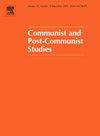冠状病毒大流行应对与选民选择
IF 1.3
4区 社会学
Q3 INTERNATIONAL RELATIONS
引用次数: 2
摘要
公众对政府应对冠状病毒大流行的看法真的会影响他们的选举命运吗?在这份研究报告中,我们通过对克罗地亚和塞尔维亚3000多名选民进行调查的初步结果来回答这个问题,该调查是在2020年夏天这两个国家举行议会选举之前在一个专门的移动应用程序和网络平台上进行的。这项调查是我们追踪冠状病毒大流行期间东南欧政治竞争、公共话语和阴谋论的更大项目的一部分。本研究报告中提出的初步调查结果表明,克罗地亚和塞尔维亚选民理性地回顾并根据对危机管理绩效的评估奖励执政党。我们还发现,有证据表明,亲眼目睹冠状病毒对健康造成影响的选民更有可能支持执政党。我们认为,这是冠状病毒大流行日益影响公民对国家政府的期望和信任的证据,这些政府对大流行的第一波做出了强有力的反应,克罗地亚和塞尔维亚就是这种情况。本文章由计算机程序翻译,如有差异,请以英文原文为准。
Coronavirus Pandemic Response and Voter Choice
Does the public perception of governments’ coronavirus pandemic responses actually make a difference to their electoral fortunes? In this research note, we answer that question by presenting the preliminary results of a survey of more than 3,000 voters in Croatia and Serbia conducted on a dedicated mobile app and web platform directly preceding parliamentary elections that took place in these two countries during the summer of 2020. This survey was part of our larger project tracking political competition, public discourse, and conspiracy theories in Southeast Europe during the coronavirus pandemic. The preliminary findings presented in this research note demonstrate Croatian and Serbian voters were rationally retrospective and rewarded parties in power based on evaluations of their crisis management performance. We also find evidence of voters who have personally witnessed the health consequences of the coronavirus being more likely to support the parties in power. We believe this is evidence of the coronavirus pandemic increasing affected citizens’ expectations of and trust in national governments where those governments respond strongly to the pandemic’s first wave, as was the case in both Croatia and Serbia.
求助全文
通过发布文献求助,成功后即可免费获取论文全文。
去求助
来源期刊

Communist and Post-Communist Studies
Multiple-
CiteScore
1.90
自引率
0.00%
发文量
23
期刊介绍:
Communist and Post-Communist Studies is an international journal covering all communist and post-communist states and communist movements, including both their domestic policies and their international relations. It is focused on the analysis of historical as well as current developments in the communist and post-communist world, including ideology, economy and society. It also aims to provide comparative foci on a given subject by inviting comments of a comparative character from scholars specializing in the same subject matter but in different countries.
 求助内容:
求助内容: 应助结果提醒方式:
应助结果提醒方式:


